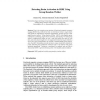Free Online Productivity Tools
i2Speak
i2Symbol
i2OCR
iTex2Img
iWeb2Print
iWeb2Shot
i2Type
iPdf2Split
iPdf2Merge
i2Bopomofo
i2Arabic
i2Style
i2Image
i2PDF
iLatex2Rtf
Sci2ools
140
click to vote
MICCAI
2010
Springer
2010
Springer
Detecting Brain Activation in fMRI Using Group Random Walker
Due to the complex noise structure of functional magnetic resonance imaging (fMRI) data, methods that rely on information within a single subject often results in unsatisfactory functional segmentation. We thus propose a new graph-theoretic method, “Group Random Walker” (GRW), that integrates group information in detecting single-subject activation. Specifically, we extend each subject’s neighborhood system in such a way that enables the states of both intra- and inter-subject neighbors to be regularized without having to establish a one-to-one voxel correspondence as required in standard fMRI group analysis. Also, the GRW formulation provides an exact, unique closed-form solution for jointly estimating the probabilistic activation maps of all subjects with global optimality guaranteed. Validation is performed on synthetic and real data to demonstrate GRW’s superior detection power over standard analysis methods.
Functional Magnetic Resonance | GRW’s Superior Detection | Medical Imaging | MICCAI 2010 | Unsatisfactory Functional Segmentation |
Related Content
| Added | 29 Jan 2011 |
| Updated | 29 Jan 2011 |
| Type | Journal |
| Year | 2010 |
| Where | MICCAI |
| Authors | Bernard Ng, Ghassan Hamarneh, Rafeef Abugharbieh |
Comments (0)

